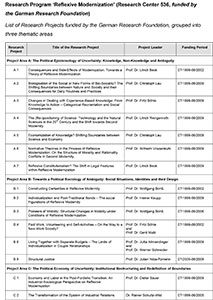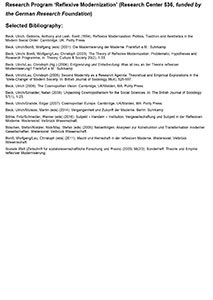Research Program ‘Reflexive Modernization’ (Research Center 536, funded by the German Research Foundation)
The research center 536, which was first approved on July 1, 1999 and lasted until June 30, 2009, was an inter-disciplinary and inter-institutional research union involving research teams from Munich and Augsburg, with sociological, social-psychological, political-scientific, historical and philosophical competencies. At the center of this joint special research program, of which Ulrich Beck was the speaker, stood the question whether societies in the 21st century could still be grasped with the concepts dating back to the 19th and 20th century. Especially when considering how the accelerated structural changes of societies with all its consequences and side-effects are eroding thought and action patterns that were deemed as the ‘natural’ foundations of modernity. Put differently: the basic principles, essential differences and key institutions of modern societies are dissolving from the inside in the course of radical modernization.
Basic understandings in modern societies
Among others, these ‘basic understandings’ in modern societies are the conviction of endless domination of nature and the attendant conceptions of technical and social progress. Plus, the fixation on the nation-state by modern societies and not least ideas of how labor is being socialized, and the modern boundary delineations of nature and society or individual and group. Observable changes in the sciences, politics, economics and society can be interpreted as a ‘structural break’ within modernity. The research program SFB 536 thematized this break in terms of a transition from ‘first’ to ‘second’ modernity or from ‘simple’ to ‘reflexive’ modernization.
Thesis of a structural break
The thesis of a ‘structural break’ within modernity was addressed by three analytical moves: (a) For one, the objective was to expose selected examples indicative of efficiency losses and changes to the basic institutions of ‘simple’ modernity since the second half of the 20th century. (b) Second, the aim was then to explore the extent to which new concepts, structures, configurations and institutions were emerging that could only be grasped and described outside the inscribed categories and demarcations of ‘simple’ modernity. (c) Lastly, the implications of this institutional transformation of basic principles on the character of domination of modern society were analyzed.
Concept of methodological cosmopolitanism
The exploration of this broad spectrum of structural changes, which are pointing to the erosion of the basic institutions of first modernity, did not only require an encompassing empirical research program, but also new frames of reference and categories of observation, in order to operationalize the question of the ‘novelty’ of this social change and make it suitable for empirical analysis. The concept of ‘methodological cosmopolitanism’ did open the social-scientific view for new historical realities, interdependencies and problems, which lie outside the myopic perspectives that inhere in the ‘methodological nationalism’ of the social sciences and throughout the internal differentiations of cognate fields. The working program of the SFB paid particular attention to two central dimensions of cosmopolitanism:
- a methodological dimension: Cosmopolitanism as a new approach to a globalized word, by which outdated boundaries from inside and out could be overcome;
- a political and historical dimension: Cosmopolitanism as a new characteristic form for social intercourse with cultural otherness, contingency and insecurity in ‘second modernity’.
Uncertainty, ambiguity, insecurity
The basic phenomenon related to structural change and the return of insecurity and ambiguity in modern society was analyzed in the context of the SFB 536 in different work projects. Here the single subprojects were assigned to three project areas, which dealt with different aspects of ambiguity, structural differentiation and institution building: Project Area A: The Political Epistemology of Uncertainty: Knowledge, Non-Knowledge and Ambiguity; Project Area B: Towards a Political Sociology of Ambiguity: Social Situations, Identities and their Design; Project Area C: The Political Economy of Uncertainty: Institutional Restructuring and Redefinition of Boundaries.
 de
de en
en
